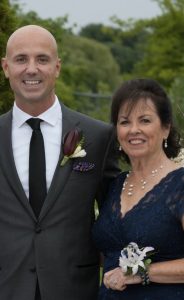
Leisure Care Vice President of Operations Michael Juno has been an essential part of our company for 15 years, bringing life-enhancing senior living experiences to hundreds of families. New experiences with his aging mother have given him a fresh perspective on caring for a senior loved one, and he has chosen to share those experiences with us on the blog.
Seeing the Warning Signs
 This was never supposed to be my story. I never imagined raising children and caring for a parent, never imagined I would be a member of the Sandwich Generation. Ever since I can remember, my mom was the one who would dominate every Scrabble game. Intelligent, funny, strong, Mom was a force of the best kind. Combine her strength and smarts with my extensive experience in senior living, and you can imagine how I wonder how we got here; how her cognitive skills started slipping without my brothers and I realizing how bad things were – until they were bad enough to warrant phone calls from the police. If you were to meet my mom today, you would never suspect the chaos that has unfolded. She’s delightful and doesn’t look a day older than 70. But that’s not where my story starts.
This was never supposed to be my story. I never imagined raising children and caring for a parent, never imagined I would be a member of the Sandwich Generation. Ever since I can remember, my mom was the one who would dominate every Scrabble game. Intelligent, funny, strong, Mom was a force of the best kind. Combine her strength and smarts with my extensive experience in senior living, and you can imagine how I wonder how we got here; how her cognitive skills started slipping without my brothers and I realizing how bad things were – until they were bad enough to warrant phone calls from the police. If you were to meet my mom today, you would never suspect the chaos that has unfolded. She’s delightful and doesn’t look a day older than 70. But that’s not where my story starts.
Probably more like your story, it started with more subtle changes, which were easier to dismiss. We began to notice Mom’s cognitive skills slipping in January of this year. Coming out of the pandemic (and the isolation it brought), we realized Mom forgot familiar words, her condominium not quite as spotless as it always was. Covid-19 protocols had stopped her daily visits to my dad in a nearby nursing home and regular visits to family in Missouri. My brother had recently moved further away from her, and Covid had also stopped his frequent visits to my mom.
Dismissed by even her doctor as expected consequences of aging, we noticed increasingly concerning signs. One night, she called a friend, insisting there were people in her home. The friend, rightfully alarmed, called the police, who quickly arrived to find the house secured and no one there. Because of my familiarity with senior health issues, I encouraged her to ask her doctor for urine analysis to check for a urinary tract infection (UTI). They can often cause hallucinations, delusions, and confused thinking. Sure enough, the urine analysis revealed a UTI. She received antibiotics to treat the UTI and then continued with a pre-planned trip to St. Louis to visit friends and family. Through it all, she fiercely maintained that there were people in her home and could not admit she may have been mistaken until much later.
Experience Leisure Care Senior Living

Azalea at Cinnaminson
Independent Living, Assisted Living, and Memory Care in Cinnaminson, New Jersey
Confronting the Truth
The 12-hour drive from Ohio to St. Louis was one she had done hundreds of times, so we were largely unconcerned when she kept her already planned trip to see family and friends. We spoke a few times over the few weeks she was gone, and she was doing well, visiting with family and friends. I knew that she was planning to make one last stop at her sister’s house on July 3rd, then was going to stay at my cousin’s house before heading back to Ohio on July 4th.
We woke up the morning of the 4th of July and started preparing for a barbeque with friends. The kids were excited about the fireworks, and we were enjoying the weekend. At 1:30 PM, the phone rang. It was my brother calling from Ohio. He said he had just received a phone call from the Indianapolis state troopers. They explained that a couple called them to their home in a rural town about an hour north of Indianapolis. Upon arriving at the scene, they found a confused and disoriented 81-year-old woman. She shared with the officer that she was following this couple to a 4th of July party. After 30 or 40 miles, the couple realized the woman was confused, so they drove to their house to help her. Mom told the couple that she was supposed to meet some friends at the party and then stay at their home that night. She repeatedly said to them that her friends were there in St. Louis. Each time the officer tried to explain that she was in Indianapolis, Mom didn’t believe it. The officers called for an ambulance, and Mom was transported to the local hospital.
When I got the call, I caught the next flight to Indianapolis from my home in Atlanta, where I took an Uber to retrieve her car and meet her at the hospital. She would not admit she was in Indianapolis, insisting I take her back to her friends’ house outside St. Louis, still convinced she was only 20 minutes away from her friends in St. Louis. She again tested positive for a UTI and was dehydrated. She was prescribed more potent antibiotics to knock out the infection once and for all. I was finally able to convince her to get in the car and make the three-hour drive home.
When we got in the car, the gas tank was empty. Mom casually shared that she had already run out of gas once, and a nice man helped fill up her tank. We can only imagine if this really happened or not. Either is disturbing; if she imagined running out of gas and getting help, then the hallucinations were raging; if a stranger really did help her, thank God it really was a nice man. It could have turned so much worse.
We made it home around 1:30 AM, both exhausted and looking forward to a good night’s sleep. The following morning, we got up and had to run errands, including filling her antibiotic prescription and stock the fridge. While doing dishes, I noticed the water wasn’t getting hot. As I investigated, I learned that her hot water had been shut off at the meter. It turns out she hadn’t paid her bill in months.
Over the next few days, we uncovered that she hadn’t paid many bills for several months. She had tens of thousands of dollars of credit card debt due to a lost card that had been left at a gas station. She knew she had left the card and planned to stop back at the gas station in Illinois weeks earlier, thinking they would still have her card. We also discovered that she had been submitting entries for every sweepstake for which she received junk mail. She was purchasing things from Publishers Clearing House in hopes of increasing her chances of winning. She also donated thousands of dollars to hundreds of charities over the last year. Anyone who asked for money, she gave it to them. She believed she received a personal note from the Pope because of all of her goodwill. It was a boilerplate thank you card with a picture of the Pope, but by no means actually from the Pope. The list goes on and on.
Being at Mom’s over those four days felt like falling into a rabbit hole. Every time we looked at one thing, we uncovered something else. My family and I sprang into action, obtaining access to her utility bills and finances, quickly taking control of her financial situation. By the time I left her home, we had made an appointment with an attorney to obtain financial power of attorney. I also installed a GPS device in her car. This has been a game-changer. It alerts all of us any time she leaves her neighborhood. But it’s not the end game.
We had a follow-up visit with her doctor and explained all that had happened. He advised her not to drive except around town. She was instructed not to leave the state. He also started her on Aricept, one of the two drugs approved to slow the progress of certain types of dementia. It made quick improvements. Things seemed to be starting to stabilize.
Facing the Future with an Aging Parent
I call her multiple times a day. Checking to make sure she charges her phone, takes her pill, and hydrates. It takes a village. My family and I are obsessed with following her on the GPS app just to make sure she’s just going on short drives.
A couple of weeks ago, we had another incident. She called me up around 10:30 PM, asking me if I was part of a group coming over. She said that some friends were heading to her place. She didn’t know if it was a joke or for real. I tried to explain that no one was coming that night. I knew immediately we were facing another UTI. The next day I called the doctor for a urine analysis (UA). The doctor’s nurse tried to tell me that a UA was not necessary because the hallucinations are just part of normal aging. Fortunately, I know that’s not true. After some convincing, I got the UA ordered, and it was later confirmed that she had the beginning of a UTI. We followed up with another round of antibiotics and a test to be sure it was gone. It was. We also created a hydration schedule, and I asked Mom daily about her hygiene habits, showering habits, and fluid intake.
A week later, the GPS alerted me that Mom took the car out around 9:45 PM. She likes to sometimes go out for frozen custard. The GPS on her car showed she had not returned home. However, the phone app we installed on her phone showed the phone was at home, but she wasn’t answering. I waited until 10:45 PM before calling the police. I asked them to conduct a wellness check. After 45 minutes, I received a call from my mother, thanking me for calling the police. She said that she had been trapped upstairs by a tall man that wouldn’t let her leave one of the guest rooms. She had the police check all over the condominium. Of course, there was no one there. She thanked me because she could hear her phone ringing, and she knew if she didn’t answer that I’d eventually call the police. It breaks my heart to think that my mom is scared because she genuinely believes the hallucinations.
We’ve now made appointments to see a Urologist and a Geriatric Psychiatrist. While the UTIs seem to be causing the majority of the confusion, certain types of dementia can also cause them. Although there are no definitive tests to diagnose any type of dementia, we hope to rule them out and explore all options. For one, how can we get the UTIs under control? And two, if it’s not all just the UTI, how can we address the hallucinations and delusions?
Like many of you, we are always wondering what is coming next, how we can prevent it, and how we can best keep her safe while encouraging her and respecting her independence.
Unfortunately, my story probably sounds a lot like yours, and like yours, the answers are not easy. We’re having conversations with her about what her wishes are. Where does she want to live? In what type of setting does she want to live? The future is unclear, and if I am honest, it’s scary. This wasn’t supposed to be my mom. But the reality is that it can happen to any of us. I am telling my story because if I can help one family get in front of these concerns before they get out of control, then it’s worth it. If anything, this makes me even more compassionate towards our family members. I have always cared immensely and take my responsibility to provide an exceptional lifestyle to our residents. But this personal experience provides perspective and deepening empathy for those of you watching your parents slip through your fingers right before your eyes. We are not alone as we care for aging parents, and even when we know what we should do, putting it into practice is more complicated when it’s your own parent. I am grateful for our village that cares so well for her, grateful for a workplace that encourages me to care for my family, but mostly grateful to be her son.
Joining a Leisure Care community is about more than just moving to senior living. It’s about making meaningful connections and realizing that you are not alone. Your family’s concerns, fears, and struggles are also ours. We may be leaders and innovators in the senior living industry, but we are comprised of people who share your struggles and want to partner with you in caring for your loved one.
Find a Leisure Care Community
Better with age, exceptional with us! Come and see how Leisure Care communities are helping seniors rediscover (and sometimes reinvent) themselves.




